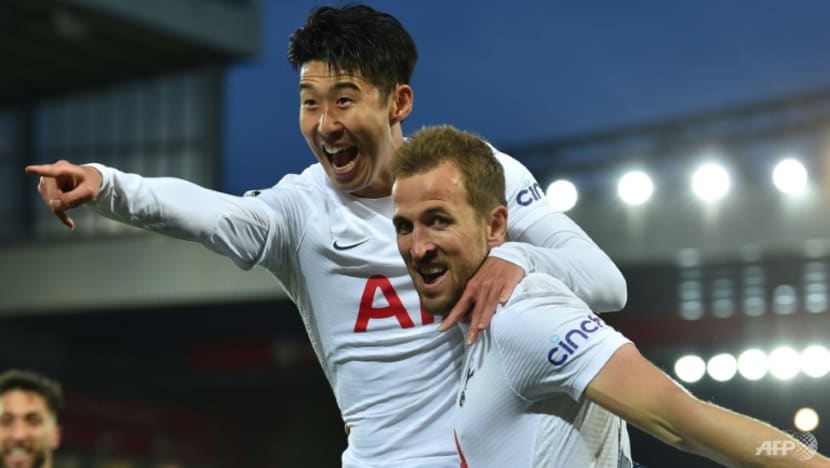Commentary: Tottenham’s Son Heung-min is not just the best Asian football player right now
Tottenham Hotspur star Son Heung-min may make waves by being the first Asian player to win the English Premier League Golden Boot, but his influence goes far beyond the pitch, says John Duerden.

Son Heung-Min (left) put Tottenham in front at Anfield (Photo: AFP/Paul ELLIS )
LONDON: On Monday (May 23), South Korean footballer Son Heung-min scored two fine goals and entered the history books.
The Tottenham Hotspur star became the first Asian to earn the English Premier League’s Golden Boot, the prize given to the player who scored the most goals that season. His 23 goals were matched only by Liverpool’s Mohamed Salah, who has won the prize twice before, but football fans will be quick to point out a subtle difference between the two.
All of Son’s goals came from open play. The Egyptian scored five times from the penalty spot – no less valued to the scoreline but generally considered to be easier. Put in this perspective, Son’s achievement is truly impressive.
It isn’t the first time Son has made waves. Back in 2015, he joined Tottenham from Bayer Leverkusen in Germany for a record transfer fee paid for an Asian player, of about £22 million (S$38 million).
Since then, he has gone from strength to strength. Son has scored at least 18 goals in each of the last six seasons, across all competitions, including cups.
And he looks set to make history again. Son needs to score just seven more times to reach 100 Premier League goals and join an elite club of 33 players in the league’s history, which includes legends like Alan Shearer and Ryan Giggs. He would also become the first Asian player to achieve this.
IS SON HEUNG-MIN THE BEST ASIAN FOOTBALLER EVER?
Could Son Heung-min be the best Asian footballer ever? Many seem to think so.
I met Son in London in May to hand him the “Best Footballer in Asia” award on behalf of Chinese media company Titan Sports, an award decided by journalists all over Asia. It was the seventh time he had received the trophy since its inception in 2013, but still, he called the honour something he had “always dreamt of”.
Son was named the best Asian to ever play in England in a poll on the Premier League’s official site in 2020 with 55 per cent, with compatriot Park Ji-sung in second. Remarkably, Park won five Premier League titles with Manchester United but Son has yet to win any trophy.
One stark difference is that while Park was an important player, he was never a regular in the starting line-up which favoured stars like Cristiano Ronaldo and Wayne Rooney. Son, on the other hand, is a crucial member of Tottenham’s team, starting almost every match on the field.
Son is the first Asian to be seen as one of the best players in a major European league, perhaps even the best league in the world right now, considering that English teams have been in four of the last five UEFA Champions League finals.
Past Asian stars have had some success in Europe, like Japan’s Hidetoshi Nakata – who held the previous transfer fee record for an Asian player – and Shinji Kagawa, or Iran’s Sardar Azmoun and Mehdi Taremi. But none have been as consistently excellent or as celebrated as Son.
CHANGING THE IMAGE OF ASIAN PLAYERS
The prominence of Son also heralds a change in the role and image of Asian players in Europe.
In the past, fans often regarded Asian players as useful marketing tools, signed on to tap into their lucrative home markets to sell shirts or attract sponsors, but not necessarily to play.
Japan’s Junichi Inamoto and China’s Dong Fangzhuo are often held up as examples. Inamoto never played a Premier League game while at Arsenal and Dong played only one for Manchester United in 2004.
Son’s stature is such that he has been used in England to market the Premier League to English fans, his face appearing on billboards around the country.
On the pitch too, Son has also shifted how Europeans view and talk about Asian players. "There are lots of stereotypes about Asians in the West, few flattering," David Goldblatt, a soccer academic, author and sociologist, told me.

Online news magazine The Diplomat also pointed out the stereotypes that English commentators rely on to describe players: European players are discussed in terms of skill, black players are “powerful” and Latino players are “tricky”. Asians are hard workers and humble.
Then came Son. "That is what Son has just smashed, because he is, as the standard cliche goes, 'world-class',” said Goldblatt.
Alan Shearer, well-established as the top scorer in English Premier League history, called Son “absolutely phenomenal”. On the UK TV programme Match of the Day, Shearer said: “(Son)’s been one of the players of the season. His finishing’s been superb, his link-up play, what he’s offered Tottenham going forward.”
AN INSPIRATION TO OTHERS
By breaking records and stereotypes, Son helps to open the way for other players to follow. According to the statistics site Soccerway, there are now over 300 players from South Korea and Japan playing professionally all over Europe.
Importantly, more are in the top tiers of the big leagues in England, France, Germany, Italy and Spain.
South Korea now has nine. Just in January, Lee Dong-jun signed for Hertha Berlin in the Bundesliga while 19-year-old Jeong Sang-bin joined Wolverhampton Wanderers in the English Premier League.
Hwang Hee-chan plays in a similar position to Son, was born in the same city of Chuncheon and has followed a similar career trajectory, playing in Austria as a teenager in 2015 and moving to the English Premier League last August in a deal worth £14 million.
To Hwang, Son is an inspiration. “He had such a great season. I am proud of the way he represents the country,” said Hwang to South Korean media.
“Whenever I see him, it motivates me to play as well as he does. And I would love to keep getting better and challenge his record. I think a lot of football players see Heung-min as their role model.”
Japan has 14 big-league stars, with nine playing in Germany’s top tier. Takumi Minamino has won titles with Liverpool while Takehiro Tomiyasu has impressed with Arsenal.
More Asian players are moving to Europe at younger ages as Son did at 16. Other South Korean and Japanese stars such as Lee Kang-in and Takefusa Kubo moved to big European clubs when they were 10 and 12.
More Asians becoming familiar and recognised as important players by agents, coaches, fans and teammates will make Europe more accessible to others.
SIMPLY ONE OF THE BEST
But while we celebrate Son Heung-min as the first Asian player to win the Golden Boot, we should not be constrained by solely this perspective.
Former Manchester United captain Gary Neville, and probably England’s highest-profile pundit, named Son the player of the season. "He'd be taken by any top club in the world … He's a special player,” said Neville.
With the kind of achievements he has pulled off, we should remember that Son is not just the best Asian player right now, but simply one of the best players.


















